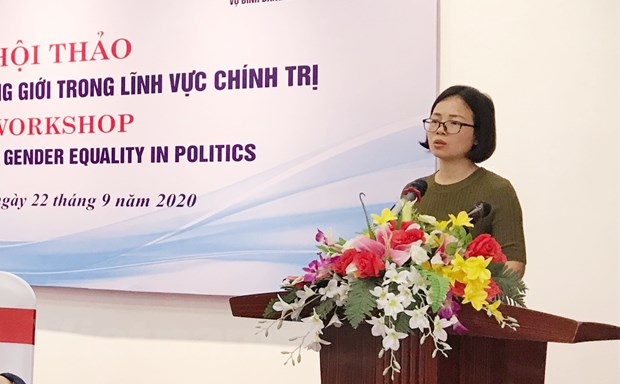 Society
Society

 |
| Trần Thị Bích Loan, deputy director of the Department of Gender Equality, gives a speech at the conference. — VNA/VNS Photo Hồng Kiều |
HÀ NỘI — Ensuring an equal number of female cadres to men in all three parts of the political system, including the Party, State, and socio-political organisations, is crucial to realising gender equality in politics, attendees at a workshop heard.
The workshop on promoting gender equality in politics was held by the Department of Gender Equality under the Ministry of Labour, Invalids and Social Affairs (MoLISA) and Oxfam in Vietnam on Tuesday in Hà Nội.
Trần Thị Bích Loan, deputy director of the department, said gender equality in the political field is considered an important issue, creating opportunities for women to speak for themselves on decision-making policies in different fields.
Resolution No 11-NQ/TW of the Politburo, issued in 2007, on women’s work defined targets for gender equality, including having 25 per cent or more female cadres in Party committees at all levels, 35 to 40 per cent of National Assembly and People's Council members being women and agencies with at least 30 per cent women members must have key female leaders. Notably, it also dictates that senior leadership offices of the Party, National Assembly, State and Government must have a proportion of women consistent with gender equality goals.
The Government concretised the above goals with the National Strategy on Gender Equality for 2011-20 with specific targets, including indicators on women's participation in politics.
Loan said that a review of 10 years of implementation of the Law on Gender Equality and the National Strategy on Gender Equality shows Việt Nam has recorded remarkable achievements, contributing to narrowing the gender gap in all fields.
“In the political field, there have been new bright spots such as for the first time there are three female Politburo members including the National Assembly Chairwoman. With 26.8 per cent of female deputies in the National Assembly, Việt Nam ranks 71 out of 193 countries worldwide; this rate is higher than the world average of 25 per cent,” said Loan.
Besides, she said, for the first time, there has been a female standing member of the National Assembly's National Defence Security Committee. Up to now, Việt Nam has nine female secretaries out of 63 provinces and cities.
Although gender equality in politics is getting more attention, the final review of the National Strategy on Gender Equality for 2011-20 shows most indicators for the proportion of women participating in Party committees, or being the key leader, have not yet been hit.
Participants in the workshop said there are many reasons for this, such as gender stereotypes still existing and some committees, authorities, branches and localities not paying enough attention to gender equality.
In addition, the system of different indicators and set targets is quite high at 35 per cent, causing difficulties for the implementation.
Phạm Quang Tú, deputy country director of Oxfam in Vietnam, said many key leadership positions in the Party, Government, National Assembly, People's Councils and People's Committees at all levels were still mainly undertaken by men. Female cadres often only hold the role of deputies, advisors and assistants. This limits women's rights and ability to contribute to politics and socio-economic development.
New targets
Facing that reality, the MoLISA is completing a draft national strategy on gender equality for 2021-30 to submit to the Government with targets and solutions to increase the number of women participating in politics.
Contributing to the draft, Lương Thu Hiền, director of the Centre for Research on Gender and Women Leadership under the Hồ Chí Minh National Academy of Politics, said it was necessary to review Party and State regulations on the age for training, retraining, promotion and appointment.
In addition, it is necessary to identify the disadvantages for women when implementing these regulations to amend in accordance with the law on gender equality.
Hiền said building a target that was comprehensive and covered the entire political system was very important because there was a flexible rotation of cadres in the Party's work. Therefore, it is very important to ensure the number of female cadres in all three parts of the political system – the Party, the State, and socio-political organisations – from the central to local levels to present gender equality in the field of politics.
Lê Thị Nguyệt, head of the Division of Child Protection and Care and Gender Equality under the Nghệ An Department of Labour, Invalids and Social Affairs said it was necessary to have separate policies for urban areas, developed regions and rural mountainous areas. — VNS